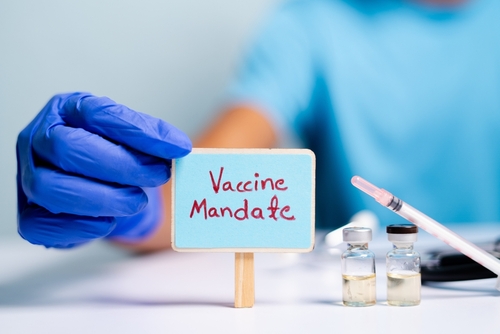Here is the skinny on the Occupational Safety and Health Administration’s (OSHA) much-anticipated emergency temporary standard (ETS) on COVID-19 vaccinations for large employers. Released on November 4, the policy requirements take effect December 5 and must be fully implemented by January 4, 2022.
What Large Employers Need to Know
Who is covered? The ETS covers all private employers with 100 or more employees. It excludes healthcare employers already covered by an earlier directive issued in July as well as federal contractors covered by one of President Joe Biden’s Executive Orders (EOs) issued in September. It also doesn’t apply to employees who (1) don’t work around coworkers or customers, (2) work from home, or (3) work exclusively outdoors.
What does ETS require? Employers must adopt a written vaccination policy requiring all employees to be fully vaccinated unless they can’t get the shots for medical reasons or because of a sincerely held religious belief. The policy may offer them the option of (1) being fully vaccinated or (2) providing proof of regular testing for COVID-19 and wearing a face covering while at work. You can find sample vaccination and testing policies at https://www.osha.gov/coronavirus/ets2.
What is acceptable proof of vaccination? To comply with the ETS, employers must require—and maintain records of—one of the following types of vaccination proof:
- Immunization record from a healthcare provider;
- COVID-19 vaccination card;
- Medical records documenting vaccination;
- Medical records from a public health immunization information system; or
- Other official documentation specifying the type of vaccine, the dates it was administered, and the healthcare provider’s name.
If employees can’t produce one of the types of proof, they may offer a sworn, signed statement that they are vaccinated and can’t provide the required documentation. The sworn statement should include the vaccine type, the dates, and the identity of the healthcare professional or clinic administering the shots.
What records must be kept? As noted above, you must maintain copies of the employee’s proof of vaccination as well as a roster of each person’s vaccination status. Both are considered medical records and must be maintained as confidential.
Do you have to allow time off? An employer must allow reasonable time off (up to four hours) for the employee to obtain a vaccination as well as paid sick leave for a worker to recover from any side effects following the shots. You are not required to provide paid leave for an employee who tests positive for COVID-19.
What are the testing requirements for unvaccinated employees? If employees who work at least one day a week opt for testing in lieu of vaccination, they must undergo testing once a week and provide documentation of the result within seven days of their last test result. Employees who don’t work every week must be tested within seven days before returning to work.
The employer must maintain records of all test results, treating them as a confidential medical records. If an employee tests positive for COVID-19, the employer must not require further testing for 90 days.
What tests are acceptable? To satisfy the testing exception, the COVID-19 test must be approved by the Federal Drug Administration (FDA) but not one self-administered and self-read (e.g., a self-read home test).
Who pays for testing? The ETS doesn’t require employers to pay for the weekly testing, but they may be required to pay under the terms of a collective bargaining agreement with a union. The testing costs also may have implications under the minimum wage requirements in state and federal wage and hour laws. The latter is a very murky question at this point.
What if employees don’t provide required test results? Unvaccinated employees who don’t provide the required weekly test results must be removed from the workplace until they do so.
What happens when employees test positive? Employers must require employees to promptly report a positive COVID-19 test or diagnosis and then immediately remove them from the workplace until they:
- Receive a negative nucleic acid amplification test (NAAT);
- Meet the return-to-work criteria set by the Centers for Disease Control and Prevention (CDC); or
- Receive a return-to-work recommendation from a licensed healthcare provider.
You are not required to provide paid leave for employees removed because of a positive test or diagnosis unless they are otherwise entitled to it under your company policy or state law. Any work-related COVID-19 hospitalizations or fatalities must be reported to OSHA under its expedited reporting requirements.
When are face coverings required? Unvaccinated employees must wear a face covering (over both nose and mouth) when working indoors or in a vehicle with another person except when they’re alone in an enclosed room or eating or drinking or when necessary for security identification or infeasible because of the nature of the work or hazards created by the mask. An employer isn’t responsible for covering the costs for the face coverings but must ensure they’re worn properly and replaced when soiled or damaged. An employer can’t prohibit customers or visitors from wearing masks.
What information must be provided to employees? You must inform employees about the ETS’s requirements and your related policies. Also, you must share information about vaccine efficacy and let them know they won’t be retaliated against for reporting work-related injuries or illnesses or safety concerns.
What’s Next?
We expect some industry groups and states to file legal challenges to the ETS, but their timing and the outcome are extremely uncertain. Given the short lead time for compliance, employers should prepare now for the December 5 deadline.
Want to learn more about what these new rules might mean for your company’s workforce? Please sign up for a FREE webinar, “President Biden’s Workplace Vaccine Mandates,” happening Monday, November 15. Registration is available here.
Albert L. Vreeland is an attorney with Lehr Middlebrooks Vreeland & Thompson, P.C., in Birmingham, Alabama. You may reach him at avreeland@lehrmiddlebrooks.com.

